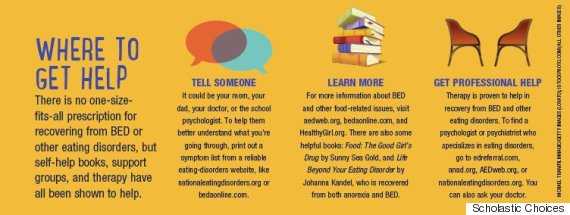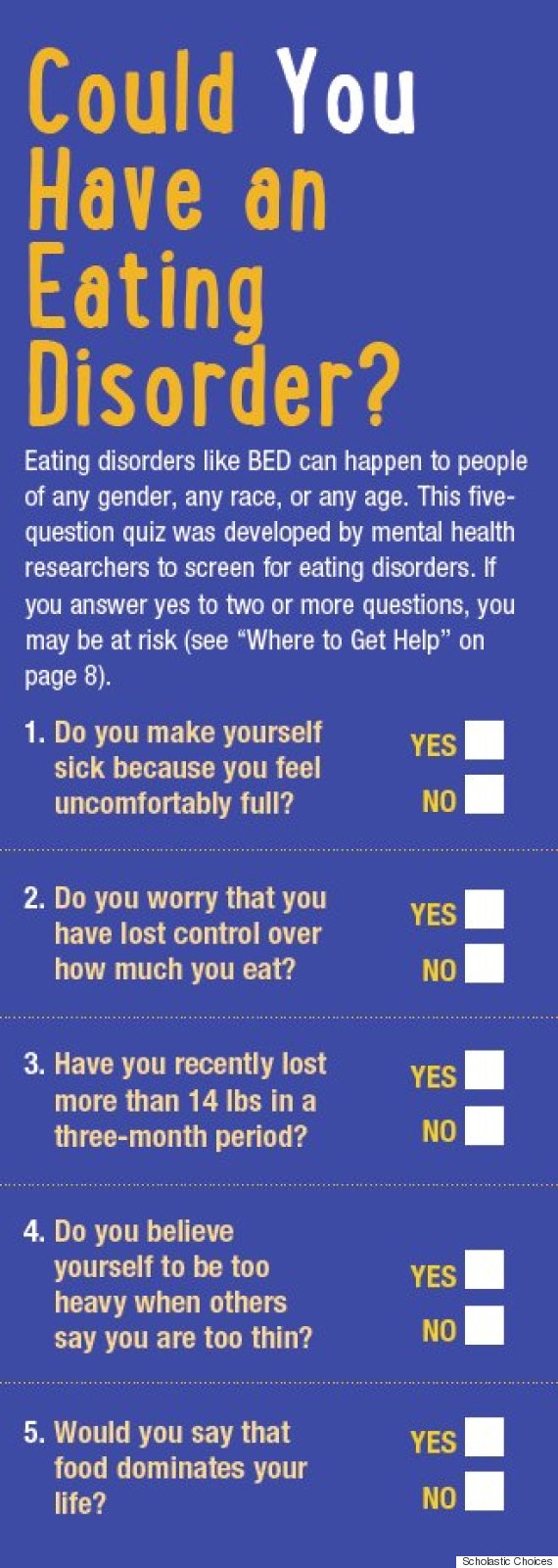
Celebrities don’t talk about it. Doctors don’t always notice it. Even those with textbook cases of binge-eating disorder may not know it. Find out what happens when the food you turn to for comfort becomes your worst enemy.
by Sunny Sea Gold
Sixteen-year-old Emily and her boyfriend had just had a gut-wrenching fight via text. Her heart felt crumbly inside her chest, and her stomach was a sour, empty pit. She felt alone, miserable, and hopeless. But then she remembered—there was something she could do, if not about her relationship, at least about the pain she was feeling.
Emily held her breath, waiting nervously for her parents to go to bed so she wouldn’t be caught. The second she saw their light click off, she quickly padded down the stairs into the kitchen and grabbed what she needed before tiptoeing back up to her room. Her arms overflowed with what she’d gathered: a plate of tortilla chips with melted cheese, a loaf of bread, butter, a jar of peanut butter, and a knife. She spread her haul out on her bed, switched on the TV and started eating . . . and eating . . . for hours, until it was all gone. When she saw the pile of trash after she was done, she hid it behind her bed. The next morning, her mom didn’t even have food left to make lunch—Emily had eaten the whole loaf of bread and more. And scarier yet, Emily didn’t even remember how much she had eaten.
What Emily didn’t know at the time was that her feast wasn’t just a way to cope with the whirlwind of feelings she was experiencing after fighting with her boyfriend—she was suffering from an illness called binge-eating disorder (BED), which causes people to uncontrollably and frequently eat huge amounts of food. If you’ve never heard of it before, you’re not alone. It’s the least discussed, yet most common, eating disorder (it’s more widespread than anorexia and bulimia combined), and both guys and girls suffer from it. But given the many mixed messages our culture has about food, BED is often misdiagnosed as simple overeating.
COMFORT FOOD
Stuffing yourself with pumpkin pie every Thanksgiving or polishing off a pint of ice cream after a major breakup may not be the healthiest way to celebrate or express your feelings, but it doesn’t mean you have an eating disorder. BED is different from the occasional comfort-eating or overindulgence that almost everyone experiences once in a while, explains Cynthia Bulik, director of the Eating Disorders Program at the University of North Carolina at Chapel Hill and author of the book Crave: Why You Binge Eat and How to Stop.
People with binge-eating disorder regularly eat unusually large amounts of food in short periods of time—and they feel out of control while doing it. BED sufferers often describe feeling as if they’re in a trance while they’re bingeing, snapping out of it only to find themselves exhausted and depleted. “I would feel bloated and nauseous, and I wouldn’t sleep well,” remembers Emily. “A lot of times, I would oversleep in the mornings because of late-night binges, and then end up being late for school or work. At one point, I was bingeing every night, and feeling so weighed down all of the time.”
SECRET SHAME
For years, Emily didn’t tell anyone what she was doing. She felt ashamed, alone, and out of control. Those feelings are typical for anyone who has an eating disorder, but the shame can be even more intense with BED, which doesn’t have famous faces attached to it like other eating disorders do. Why don’t celebs confess to BED, as they do to anorexia? It’s simple: There’s a stigma involved. “Overeating is seen as very negative, but dieting to be skinny is seen as positive and even associated with determination,” says Charles Sophy, a psychiatrist in Bevery Hills, California. But whether an eating disorder is restrictive or bingeing, or a mix of both, it’s damaging mentally, emotionally, and physically, and it needs to be treated as a mental health issue.
Unfortunately, if those affected by BED don’t feel comfortable reaching out for help, it can be difficult for an outsider to recognize that there’s a problem—and this goes double for guys, who account for an estimated 40 percent of BED sufferers. Everyone is used to seeing boys eat a lot of food—it’s socially acceptable and normal, says Andrew Walen, a therapist and author of Man Up To Eating Disorders. “We say: ‘He’s a growing boy, let him eat,” explains Walen (who himself is recovered from BED). “There’s something in the masculine identity that makes largeness somehow feel OK.” Typically guys with BED don’t get help until they’ve gained a significant amount of weight, and even then, the underlying disorder often goes untreated.
Plus many males are under the mistaken impression that eating disorders are a “girl thing”—so they’re even less likely to recognize they have a problem.
FINDING THE SOURCE
“Some parents or friends may look at a teen with BED and think, ‘Oh, a good diet and some willpower with do the trick.’ But that’s not true,” says Dr. Ovidio Bermudez, a pediatrician at the Eating Recovery Center in Denver. “Eating disorders are real physical and mental health issues; it’s not about willpower.” The focus in treating BED shouldn’t be on weight—because as with all eating disorders, the behaviors with food are a symptom of something deeper.
Binge eaters often use food as a way to get some comfort and relief from tough situations—like breakups or stressful family lives. And like most other diseases, genetics probably play a big part in who gets BED and who doesn’t. If you have a close relative with an eating disorder, that means you’re more likely to develop an eating disorder of your own.
Diets may be another surprising trigger. Many people with binge-eating disorder have tried at some point or another to control it by going on a diet, but paying more attention to food doesn’t help. And it might even make things worse, like it did for Carla, who’s 15 now and is recovering from BED. “My parents would always tease me about my weight, so when I was 14, I went on a very restrictive diet,” she says. “I was seriously depriving myself of food and became obsessed with counting calories.”
When you can’t have something, you only want it more, so every time Carla would “mess up” and have a bite of a treat that wasn’t allowed on her strict diet, she would quickly lose control and binge. Then, feeling guilty, she’d jump-start the diet again, hoping to reverse the damage.
This boomerang effect continued—eventually developing into binge-eating disorder.
TAKING BACK THE POWER
Like Carla, Emily felt like she was stuck on a crazy food-filled roller coaster and she didn’t know how to get off. “I knew I didn’t like my body, and I knew I snuck food and binged all the time, but I never really understood that it was a disorder,” she says. Then, one day about four years ago, Emily was flipping through the pages of a magazine and came across a story that listed the symptoms of BED. She was stunned. “The list shocked me—I knew then that I had binge-eating disorder,” she says. “Finally being able to put a name on something I’d struggled with my whole life was the most important step toward getting better.”
Emily is now 23 and works for a nonprofit organization. She no longer obsesses about food or her body. “I’m not a perfectly healthy eater, but food no longer has the same power over me.”
And for those who think they may be suffering from BED or another eating disorder, Emily has a message for you: “What you are feeling is real, and it’s OK to admit to yourself that you need help. Living a life without shame, without the piles of trash behind your bed, without the sneaking around is possible. It takes time, but it gets better once you take that first step and reach out for help.”



